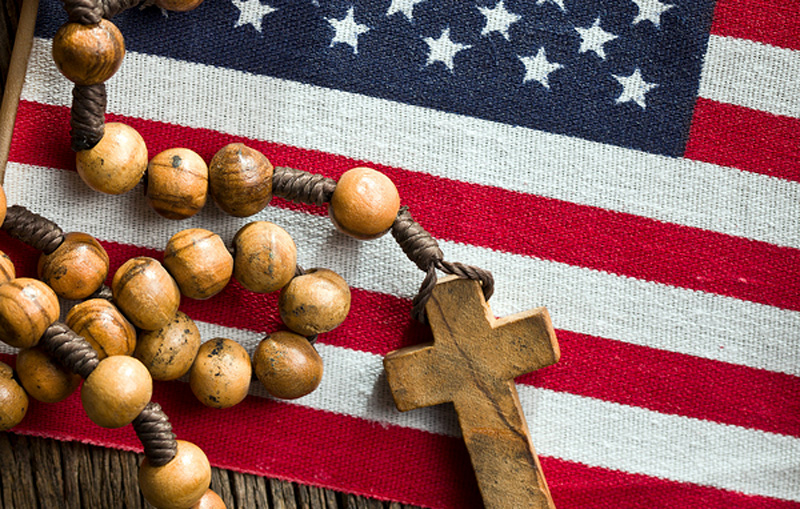
With the upcoming election, Catholics will be facing a weighty choice in the voting booth. The South Carolina Catholic Conference issued a voter’s guide to help Catholic Americans with their “serious moral obligation to vote”. This brief overview covers some of the many issues the faithful must consider when choosing their next president and “it is intended as a starting point to help people respond to their choices in the current political landscape”.
The Right to Life and Dignity of the Human Person
Innocent human life is destroyed by abortion, euthanasia, “fertility treatments” such as in-vitro fertilization, experimentation using stem cells from human embryos, and cloning to manufacture human body parts. Catholic teaching about the sanctity of human life also leads us to oppose the death penalty, genocide, torture, unjust wars, and economic policies that ignore the needs of the poor and vulnerable.
Call to Family, Community, and Participation
The family, which emerges from marriage between a man and a woman, is the original and basic unit of society. Social and economic policies should work to strengthen the family rather than weaken it.
Rights and Responsibilities
Every human being has the right to life and to religious freedom. Everyone has a right to refuse to participate in actions contrary to one’s religious beliefs and to share and defend one’s creed and moral principles in the public forum. Everyone has the right and duty to participate fully in all aspects of life: political, social, cultural, and economic.
Options for the Poor and Vulnerable
We must have special concern and charity toward the unborn, persons with disabilities, the dying, refugees, long-term unemployed, prisoners, and all who are marginalized in our nation and beyond. Today, the situation of immigrant workers is especially urgent.
Dignity of Work and Rights of Workers
Economic justice includes the opportunity for dignified work at wages sufficient to support a family, workplace safety, and the right to take time for religious observances. Workers also have the duty to provide a fair day’s work for a fair day’s pay.
Solidarity
Loving our neighbor has global dimensions and requires us to eradicate racism and address the extreme poverty and disease plaguing so much of the world. We are called to welcome the stranger among us, including immigrants seeking work, a safe home, education for their children, and a decent life for their families. We are called to promote peace and pursue justice.
Caring for God’s Creation
As stewards, not owners, of the earth, people have an obligation to cherish and care for the environment. The earth yields forth many resources needed for human flourishing, especially energy and the capacity to produce food. These precious resources must be used prudently, fairly, safely, and with a constant concern for future generations.
There are many issues before us, but every issue is not equal
Issues that directly affect human lives, such as abortion and euthanasia, are fundamental and demand serious consideration.
Our Constitution heralds religious liberty in the First Amendment, yet increasingly, people of faith are having to fight to retain this basic right.
Our nation has redefined marriage. The marriage of a man and a woman is the foundation of the family and an essential core element of a flourishing society.
The growing disparity between rich and poor means most of the world’s resources are in the hands of a small percentage of its people. The federal budget is a moral document and we should prioritize the poorest and most vulnerable among us.
The millions of undocumented persons living in the United States deserve our compassion. Our immigration system is broken, and we need a humane solution to it.
War, terror, and violence have caused thousands of lost lives. We must work for just solutions to conflict in the Holy Land, throughout the Middle East, and beyond.
As Catholic citizens, we should remember three things:
- Respect for the dignity of each person is the core of Catholic social and moral teaching. This is our most basic principle.
- We focus on the common good, not our own personal interests. We ask, how can we make the world a better place? Not, how can I improve my own personal situation?
- We have a responsibility, a true obligation, to form our consciences and participate in the civic life of this nation.
Here are ways to form our consciences and participate in civic life:
Be true to the teachings of the Church. Read Scripture, the Catechism of the Catholic Church, teachings from the Holy See, and the statements of our bishops. Read “Forming Consciences for Faithful Citizenship.” We need to be sure that our reasoning and judgments are well-grounded in our faith.
Stay well-informed about issues through judicious and reasoned engagement with the immense world of information in the 21st century. Just as all issues are not equal, all sources are not equal. For example, an individual’s blog, while potentially very insightful, may not have the same fidelity to factual truth as our media sources that hold themselves to professional standards of journalistic ethics, imperfect though they are.
Remain in contact with our representatives in local, state, and federal government. Our responsibility to form our consciences leads to an obligation to be active citizens.
Engage in reasoned, compassionate, and loving dialogue with others, Catholics and non-Catholics alike, about the issues and choices that we are facing as a nation. Remember that we are all called first to witness the Gospel, and through that witness, to share our social teaching to highlight the moral dimensions of issues, and to participate in debate on public policy.
Click here for more voting resources from South Carolina Catholic Conference.

